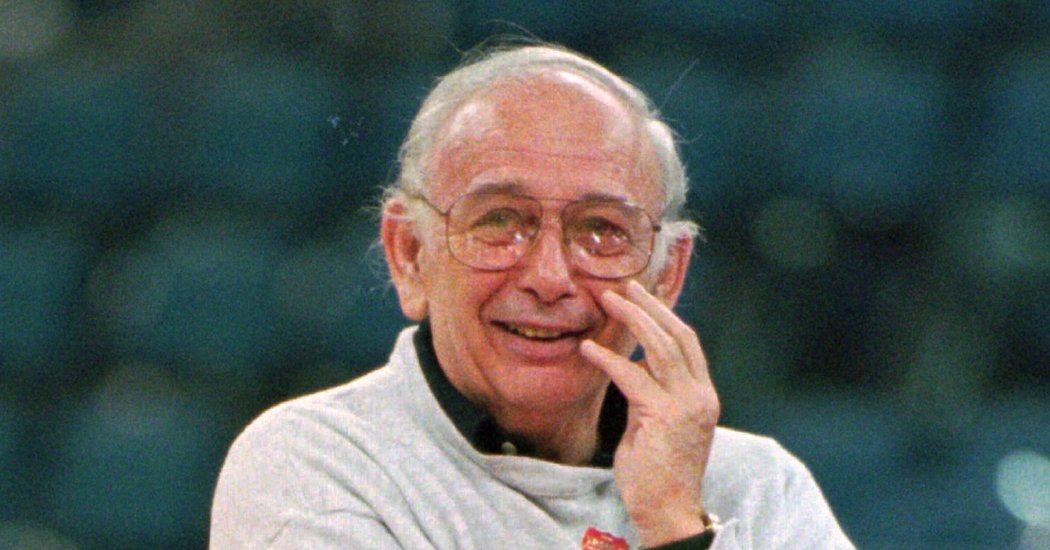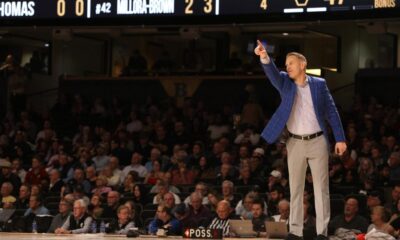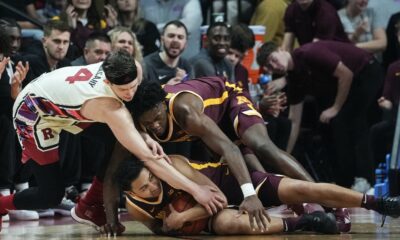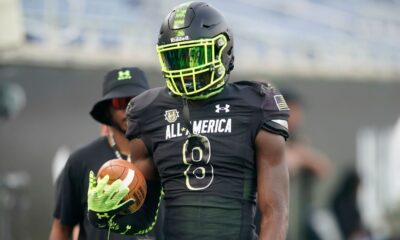
Pete Carril, a 29-year men’s basketball coach at Princeton University who terrified high-profile opponents by playing old-fashioned textbook games of small, often underskilled academics, died Monday. . he was 92 years old.
his family announced his death in a statement Posted on the Princeton Tigers website. The location and cause of death have not been disclosed.
As the men’s head coach from 1967 to 1996, Caryl (pronounced Care ILL) taught Thinking Men’s Basketball at Princeton University. Ivy As a member of his league, Princeton was unable to offer sports scholarships and its academic demands were high, but Carrill’s teams almost always won twice as often as he lost. was
His record at Princeton University is 514-261, 13 Ivy titles, 11 appearances in the National Collegiate Athletic Association championship tournament, and two appearances in the National Invitational Tournament (which his team won in 1975). , was only one losing season. His 14 on his Princeton team led the nation in defense. In 1997, he was elected to basketball hall of fame in Springfield, Massachusetts.
He emphasized deliberate off-the-ball offense, where players pass the ball and continue to set screens until the shooter opens or someone is freed to the basket in patented backdoor play. My scores were low, and no matter how much my opponents prepared, they often gave up and lost their motivation.
“Playing at Princeton is like going to the dentist,” said North Carolina State coach Jim Valvano. who died in 1993 47 years old.
New York Times sportswriter Bill Pennington wrote: The most avid hoops his junkie could be fascinated by Pete his caryl his team in motion. It was team basketball, not talent. It may not be the way everyone should play, but it used to be the way everyone tried to play. “
At the NCAA’s annual tournament, Carrill’s team may lose to national power, but not before upsetting them and threatening an upset. In the first round alone, Princeton lost to Georgetown in 1989, where he lost 50-49, Arkansas in 1990, where he lost 68-64, and Villanova in 1991, where he lost 50-48. I lost.
Caryl’s final college win First round of the NCAA Tournament on March 14, 1996 in Indianapolis. against UCLA, the defending champion. The 13th-seeded Princeton, who was seven points behind with six minutes to go, scored—what else?—with him backdoor with 3.9 seconds to go and the win. the next day, Daily Princetonianthe student newspaper ran this headline on page one.
“David 43, Goliath 41”
Carril said he wasn’t under any illusions. (The Tigers lost 63-41 in the second round to Mississippi State.)
Around Princeton campus, he was revered as a raspy-voiced figure in well-worn sweaters and baggy khakis (or bow ties, for formal attire). A colleague of his once described him as “a rumpled Lilliputian who looks as out of place in an Armani suit as he does in a Vera Wang gown”. And during the match, he was known for his style of animation coaching.
Every year, at the first practice session, Caryl gave the same speech to the players.
“I know about your academic burden,” he said. “I know how hard it is to give up playing time here, but let me make one thing clear: There is no such thing as an Ivy League player in my book. The moment you cross the white line, you are a basketball player.”
But he also told his players:
“Princeton is a special place with very special professors. To be taught by one of them is special. But you are not special just because you happened to be here.”
Pedro Jose (later known as Peter Joseph) Carril was born on July 10, 1930 in Bethlehem, Pennsylvania. His father was an immigrant from Spain in Bethlehem where he worked in a steel blast furnace for 40 years. his work day.
At high school in Bethlehem, Pete was an all-state basketball player, and at Lafayette, where he played Butch Van Breda Corfu, he was a Little All-American. He then spent 12 years as a high school basketball coach in Pennsylvania while earning a master’s degree in education from Lehigh University in 1959.
In the 1966-67 season, he led Lehi to an 11-12 record. Van Breda Kolff, who was then coaching Princeton, then took over as coach of the Los Angeles Lakers of the National Basketball Association. Princeton saw Bobby Knight and Larry Brown as his successors.
He retired from college coaching after the 1995-96 season.
“I’ve dodged bullets for 30 years,” Caryl said. “I realized I didn’t see much. I thought the kids felt my coaching was worth the five points in the game to them. Maybe that was the case.” But now I feel like I don’t feel that way.I think the difference is small.”
The following year, he became an assistant coach for the NBA’s Sacramento Kings under his coach. Rick Adelman, spends most of his time disassembling game tapes. He remained with the team for most of his next decade, retiring in 2006, but three years later he returned to the Kings as a consultant at the age of 78.
“I don’t mind being an assistant at all,” he said. “I’ve had enough of getting worse, stomach pains, headaches when you do something wrong or lose, or all the problems you have as a head coach.”
Wrote “The Smart Take From the Strong: The Basketball Philosophy of Pete Carril” (1997) with Dan White. his coaching method academic paper Francis Petit, a marketing professor at Fordham University, in his book, What Executives Can Learn from Pete Carrill.
Information about his survivors was not immediately available.
Caryl was ambivalent about her success. He once said: I tell them not.
But even if none of his teams earned top honors, he would be remembered. He wiped it out too.
“Winning a national championship isn’t something you do at Princeton,” he said in his final year there. “I resigned a few years before that. Anyway, what does that mean? When I die, maybe two men will walk past my grave and one will say to the other: I’ve never won a national championship, and I never hear a word they say.
Frank Litsky, a longtime Times sportswriter, said: passed away in 2018William McDonald contributed to the report.















